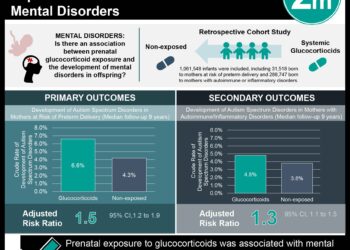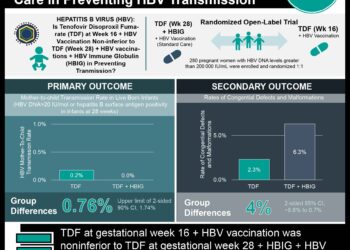Post-partum concern-focused smoking cessation intervention not effective at reducing relapse
1. Amongst women who quit smoking during pregnancy, an intervention consisting of cognitive behavioral therapy techniques to address post-partum concerns of mood, stress, and weight did not reduce relapse rates at 52 weeks compared to a control support intervention.
2. Smoking relapse was higher in those with more stress, depressive symptoms, younger age, shorter time of having quit at baseline, black race, and lower education level.
Evidence Rating Level: 1 (Excellent)
Study Rundown: It is common for women to quit smoking during pregnancy, yet many relapse in the post-partum period. Interventions to support women who quit smoking have been shown to be effective at increasing abstinence rate, but the majority of women relapse long-term. The described randomized study sought to evaluate the effectiveness of a program (STARTS) that incorporated cognitive behavioral therapy (CBT) techniques to address post-partum concerns of mood, stress, and weight in comparison to a control program (SUPPORT) that had similar time spent with a smoking cessation counselor, but did not address the aforementioned post-partum concerns.
The results of the study showed rates of biochemically proven abstinence from smoking measured at 12, 24, and 52 weeks post-partum were similar between the two groups. Women with less perceived stress, fewer depressive symptoms, longer period of cessation at baseline, and lower cigarette use were noted to have higher rates of abstinence. This study was well designed to evaluate strategies for smoking cessation and had rigorous objective testing to confirm smoking abstinence. The use of a control program also strengthened the study. However, high rates of abstinence in both groups, compared to prior literature, may have decreased the power and hindered the detection of differences between the two groups. Also, compliance rates were lower in the intervention group compared to the control group, which may have affected the results.
Click to read the study, published today in JAMA Internal Medicine
Relevant Reading: Smoking Cessation, Maintenance, and Relapse Experiences Among Pregnant and Postpartum Adolescents: A Qualitative Analysis
In-Depth [randomized control study]: This study recruited women between March 2008 and December 2012 who quit smoking during pregnancy and were motivated to remain abstinent. Women were randomized to take part in either the STARTS program that involved specific CBT methods for addressing common post-partum concerns of mood, stress, and weight, or a control SUPPORT program that involved supportive counseling that was matched for time and provided common smoking cessation strategies. Relapse was confirmed by patient reported smoking for 7 consecutive days, exhaled carbon monoxide >8ppm, or salivary cotinine levels exceeding 15 mg/L.
The rates of smoking abstinence for the overall cohort were 38.0% at 12 weeks, 33.7% at 24 weeks, and 24.0% at 52 weeks, and did not differ between the two groups (p = 0.28 at 52 weeks). Compliance to planned intervention was noted in 96.7% of control group sessions but only 83.3% of STARTS program sessions (p = 0.003). Factors that were associated with relapse were younger age (p = 0.02), fewer number of weeks quit at baseline (p < 0.001), black race (p = 0.01), less education (p = 0.01), and history of heavier smoking (p = 0.02). Women with more depressive symptoms (p = 0.04) and higher stress (p = 0.003) were also more likely to relapse.
Image: PD
©2016 2 Minute Medicine, Inc. All rights reserved. No works may be reproduced without expressed written consent from 2 Minute Medicine, Inc. Inquire about licensing here. No article should be construed as medical advice and is not intended as such by the authors or by 2 Minute Medicine, Inc.







